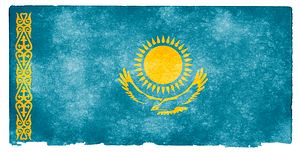In one of Kazakhstan’s highest profile corruption cases, former Economy Minister Kuandyk Bishimbayev stands accused by the state of bribery and embezzlement stemming from his days as chairman of the state-run holding Baiterek.
Bishimbayev (whose name can also be anglicized as Quandyq Bishimbaev) went on trial last November alongside 22 others, some of whom have already plead guilty and others who, like Bishimbayev, maintain their innocence.
In his first comments in court since the trial began Bishimbayev apologized to Kazakh President Nursultan Nazarbayev. According to RFE/RL, he said, “I feel ashamed for the situation I am in now. I failed the president when I created my team… I picked up wrong people, who used me and my trust. I apologize to the president and to the nation for that.”
Bishimbayev said he would always be “deeply loyal to the president and the interests of our country and people.”
When he was arrested in January 2017, Crossroads Asia’s Paolo Sorbello recounted Bishimbayev’s downfall:
Kuandyk Bishimbayev served as economy minister from May to late December 2016, when he was abruptly dismissed. A couple of weeks later he was first detained and then arrested on corruption charges. He is accused of having accepted bribes between 2013 and 2015 while heading the Baiterek Holding, a state-owned conglomerate in charge of several other companies that oversee or carry out government tenders. The charges could land him a 15-year sentence.
Investigators say Bishimbayev embezzled about $3.1 million from a $130.6 million construction project. Bishimbayev reportedly received about $2 million personally.
The scheme, as the 23-person case demonstrates, took a network to achieve and involved two companies, laundering through payments disguised as being for construction workers’ food and housing, and routing to Bishimbayev via his cousin.
As Bruce Pannier has written, there are also notes of elite politicking behind both Bishimbayev’s meteoric rise — he was named economy minister at the age of 36 — and his sudden downfall several months later.
Bishimbayev was not the first Baiterek Holding chairman to face corruption charges. In November 2016, a month before Bishimbayev’s downfall began with his dismissal, Bakhyt Zhaksybaev was arrested. Zhaksybaev was another former chairman of Baiterek Holding’s board, as close to his arrest as April 2016, according to a press release which names him as chairman. At the time of his arrest, Zhaksybaev was chairman of another joint stock company, the Kazakhstan Center for Modernization and Development of Housing and Communal Services, under the economy ministry.
In Transparency International’s 2016 corruption perceptions index, Kazakhstan fell into the bottom quarter. Despite a handful of arrets of high profile figures for corruption, it remains a serious issue in the country and only time will tell if the rooting out of corruption officials is more politics than it is reformation of institutional practices.

































